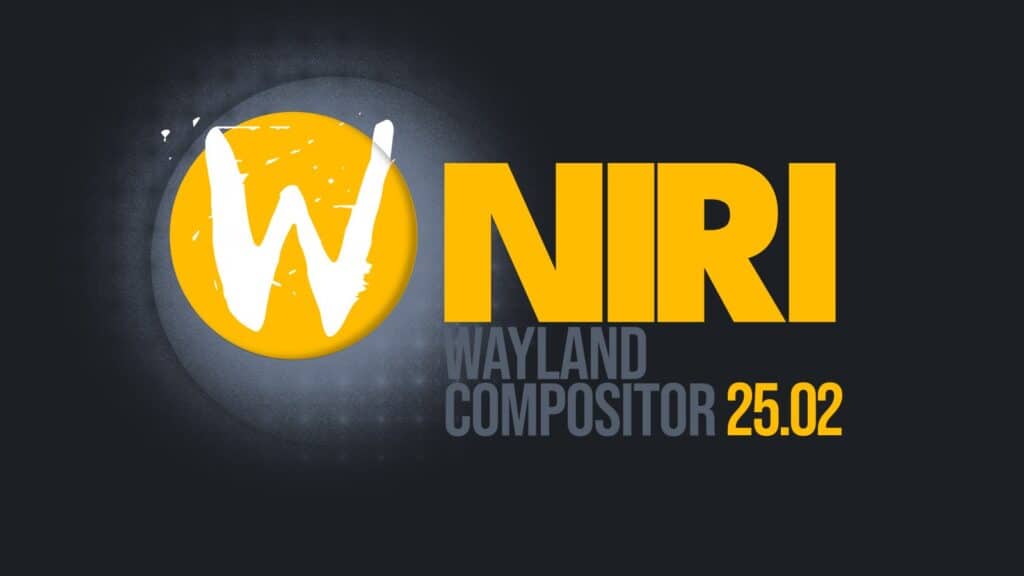Over a month after its previous 25.01 release, Niri, the scrollable-tiling Wayland compositor, rolls out a new 25.02 version, unveiling a wealth of new features and improvements.
The most striking of them is the support of tabbed columns, which let users present windows as tabs instead of stacking them vertically. This feature is especially useful when screen space is limited or if you often switch between large windows and want to minimize scrolling.
All standard navigation methods still apply, so there’s no steep learning curve. You can quickly flip through tabs using keyboard shortcuts such as focus-window-down or focus-window-up, and you can easily add or remove windows from a column.
Moreover, new actions like focus-window-top/bottom navigate directly to the first or last window, and focus-window-down-or-top/focus-window-up-or-bottom seamlessly cycle focus around the column.
Furthermore, users can customize the placement of the tab indicator (top, bottom, or right side of the column), change its appearance, and even set up rules to make new windows open in tabbed columns by default.
The next big new feature in Niri 25.02 is that this release introduces shadows behind windows. While these shadows look elegant, they also serve a functional purpose—making it easier to see the boundaries of floating or overlapping windows. Just add that they must be explicitly added to the configuration to take advantage of them.
You can then customize various shadow properties—such as softness, spread, offset, and color—on a global or per-window basis. In addition, these same shadows are now available for layer-shell surfaces, like launchers or panels.
Another user-experience enhancement in Niri 25.02 is the ability to scroll the view left or right during drag-and-drop by moving the mouse near the monitor’s edge. However, Niri introduces a slight debounce delay before the scrolling starts, allowing for quick mouse movements across monitors without accidental scrolling.
Of course, you can tailor the scrolling speed and debounce delay in the new configuration section. Moreover, this feature also works when dragging a window in the tiling layout, though it won’t trigger for dragging floating windows.
This update also offers an Important Hotkeys dialog that appears at startup, listing essential key binds for new users. You can add custom titles to binds or hide them completely by using the hotkey-overlay-title property.
In addition to the headline features, Niri 25.02 brings an impressive list of other enhancements and fixes, with the most important being:
- Virtual Pointer Support: The compositor now implements the wlr-virtual-pointer Wayland protocol required by remote desktop and similar tools, allowing them to interact with Niri’s pointer events.
- Scroll Factor Property: A new
scroll-factorwindow rule property provides fine-grained control over scrolling speeds on a per-window basis. - Toggle Window Rule Opacity: A new
toggle-window-rule-opacityaction temporarily makes a window fully opaque if it has been made semitransparent through a rule, helping with readability when needed. - Option to Disable Primary Clipboard: By adding
clipboard { disable-primary; }in the configuration, you can fully disable the middle-click paste feature. - Workspace Management Actions: New actions now let you move a workspace to a specific index with
move-workspace-to-indexor relocate it to a different monitor withmove-workspace-to-monitor. - Improved Horizontal View Movement: Adjustments in the tiling behavior now allow windows to snap more gracefully to the center of the screen when they cannot fully fit side by side.
- Drag-Lock for Touchpads: A
drag-lockinput flag can be enabled to streamline touchpad dragging and prevent accidental release. - GNOME Control Center Integration: The compositor supports a D-Bus interface that permits the Displays panel in GNOME Control Center to make temporary configuration changes without modifying the main Niri config.
- Enhanced Error Reporting: The new miette-based error messages are both clearer and more helpful during configuration parsing, improving troubleshooting.
- Reduced Idle Activity Notifications: Idle notifications now occur at most once per event loop iteration, eliminating potential lags on systems with high-frequency input events.
- Pointer and Border Fixes: Various pointer interaction and window border issues have been resolved, ensuring clicks and corner radius settings behave correctly.
- Animations and Stability: Issues affecting animations with overdamped springs have been corrected, and various long-standing bugs related to window resizing and focus handling have been fixed.
- Named Workspaces Persistence: Named workspaces now reliably “stick” to their original monitor, simplifying multi-monitor workflows and reconnections.
- Faster Config Reloading: Configuration files are parsed on a separate thread to eliminate microstutters during live reloads.
Check out the release announcement for more information about all novelties, where you will also find a few videos showing the new features of the Niri 25.0.2 scrollable-tiling Wayland compositor in action.
